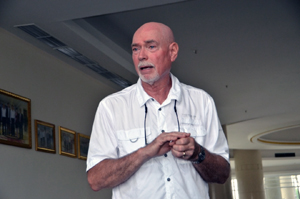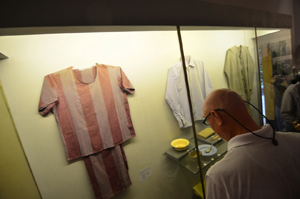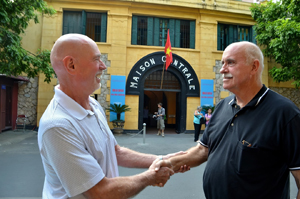"I was born on 1 January 1940 in Columbia, Missouri and lived there for twenty-two years I have two sisters, one older and one younger, named Katherine and Vevona respectively. I was a graduate of Hickman High School in Columbia where I played football and ran track. My father is a Professor in the Agricultural Extension Department of the University of Missouri and my mother is on the Stephens College faculty.
"As a young man I enjoyed cars and water skiing when I could, and flying later in college. During those summers I spent many days working on my dad's farm in North Missouri, and that provided many thoughts during my stay with the communists.
"I graduated from High School in 1957, entered UMC College of Engineering and pledged Phi Delta Theta social fraternity. In February 1962 I was married and I entered the Ari Force shortly after graduation in June of that year. My first tour of duty was at Reese AFB, Texas where I attended pilot training and flew the T-33 and T-37. During this year my daughter, Renee, was born. After graduation I was assigned to the Air Evacuation Squadron at McGuire AFB, New Jersey and flew the C-131. In February of 1965 I entered the RF-4C Combat Crew Training School at Shaw AFB, South Carolina, and upon completion I went to Alconbury AB, England with my family to join the 1st Tactical Reconnaissance Squadron, It was from there that I was sent to Udorn, Thailand in September of 1966. My family returned to Columbia, Missouri.
"I had flown more than sixty missions over North Vietnam when I was downed by AAA on 12 March 1967 in western Hoa Binh Province in North Vietnam. I was captured almost immediately by swarms of militia. I remained in North Vietnam for almost six years during which time I contracted malaria. I was released in February 1973 and met my son, Keith, for the first time at Scout AFB, Illinois where I was being treated for malaria. It is now cured but a period of time is required for the body to rebuild itself.
"During my visit to North Vietnam I fell back on three faiths. Faith in God, country, and family. I developed a rewarding and strengthened faith in God and I thank God for being American. For, regardless of what "they" said, or how hopeless the situation might have seemed at times, I knew I was never forgotten or abandoned. However, I still find it hard to comprehend the national emotion on the POW issue. I never imagined it to be as I found it when I returned. Fantastic!!
"Our communications with each other and faith in each other along with our great sense of national pride, made it easy to remain united against the Red wedge that tried to split us. And "they" never understood.
"For the future I plan to remain in the Air Force and attend the University of Missouri at Columbia for a Master's Degree in Business Administration.
"I have come to appreciate my freedom as an American so much more and will no longer take it for granted the great affluence of our society. I pray that others will not have to suffer to really appreciate what it means to be an American."
– Documents and Photos Courtesy Clark Special Collections




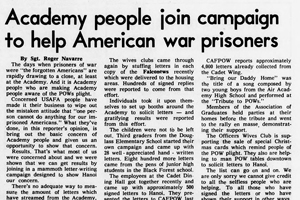
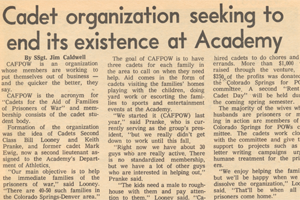
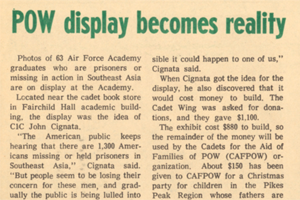
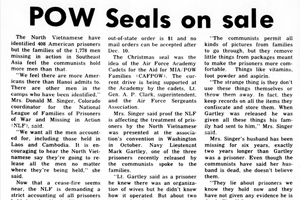
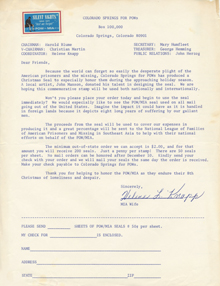
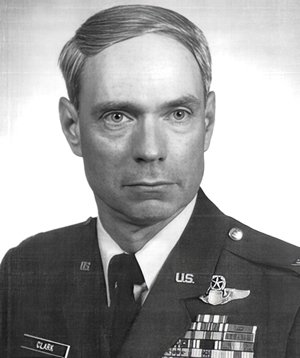
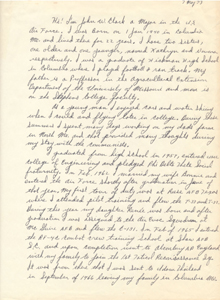
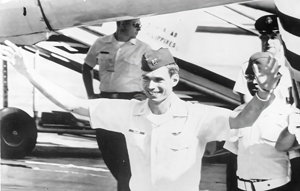
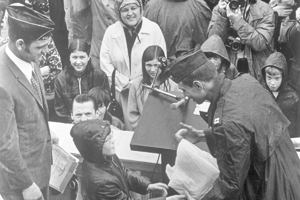 Captain Clark receiving a large book of "Welcome Home" letters from the school children at a reception in his hometown, Columbia, Missouri
Captain Clark receiving a large book of "Welcome Home" letters from the school children at a reception in his hometown, Columbia, Missouri